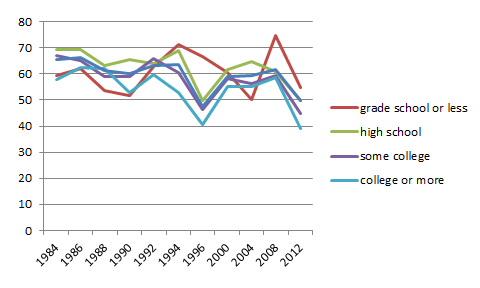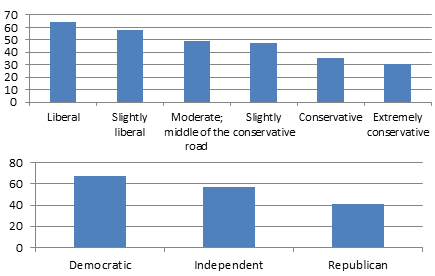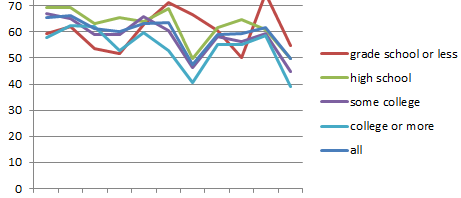- Facebook356
- Twitter1
- Total 357
Pew reports: “Highly educated adults – particularly those who have attended graduate school – are far more likely than those with less education to take predominantly liberal positions across a range of political values. And these differences have increased over the past two decades.” Indeed, “more than half of those with postgraduate experience (54%) have either consistently liberal political values (31%) or mostly liberal values (23%).”
Based on that finding, one might assume that the most educated Americans stand the furthest left on our political spectrum. And, based on that premise, one might conclude that …
- The people who would benefit most from left-of-center policies don’t support those policies, and the people who do support those policies don’t benefit from them–which is a paradox. OR …
- Liberal programs are special-interest subsidies for people with advanced educations (like lawyers, physicians, and teachers), and that is why they vote for them.
- Progressives tend to be smug or condescending because we tend to be highly educated and convinced that we support policies that are better for other people–and this is an unattractive attitude that loses votes.
- Colleges and graduate schools are moving people left (either because they have ideological agendas or because “reality has a liberal bias”).
I’d actually propose a different view from any of the above. Pew does not find that highly educated people are the furthest left. Rather, people with the most schooling consistently give answers that are labeled liberal on a set of 10 items that range over economic, foreign, and social policies. None of the survey questions offers a radical opinion as an option. So Pew is measuring consistency, not radicalism.
Ideological consistency is correlated with education, but not necessarily for a good reason. More book-learning makes you more aware of the partisan implications of adopting a stance on any particular issue. So, for instance, conservatives are more likely to disbelieve in global warming if they have more education–because their education helps them (as it helps everyone) to see the ideological valence of this issue.
Many of the most educated Americans endorse a certain basket of political ideas that are associated with the mainstream Democratic Party. They have learned to recognize these policies as the best ones, and the policies are designed to appeal to them. All of the positions are labeled “liberal,” so the most educated are deemed liberals. Yet the most educated are not the most committed to equality. Instead, they are quite comfortable with their advantages, even as they endorse positions that Pew calls liberal.
To test that hypothesis, I wanted to look at a survey question about equality that has been asked over a long time period with large samples. The best I found was this American National Election Study question: Do you agree that society should make sure everyone has equal opportunity? This is not an ideal measure, because support for equal opportunity is not the most egalitarian possible position. If you are very committed to equality, you may prefer equal outcomes. Still, the question provides useful comparative data.
In 2012, the more education you had, the less likely you were to favor equality of opportunity. The whole population was less supportive than they’d been in 2008 and less supportive than at any time in the 1980s. But the least educated were the least supportive of equality during the Reagan years, and now they are the most concerned about it.
As of 2012, the most educated Americans are the least egalitarian, even though they are consistently “liberal.” Less than half of them strongly favored equality of opportunity.
It’s true that Democrats and liberals are (as of 2012) more likely to support equal opportunity than Republicans and conservatives are–and that the highly educated are the most liberal. However, the correlations between egalitarianism and partisanship or ideology are not tight. Forty percent of Republicans strongly agree that society should make sure everyone has equal opportunity, as do 30 percent of extreme conservatives. This is partly because conservatives also have an equal opportunity agenda, and partly because the liberal-to-conservative scale is defined by a whole basket of issues. It’s quite possible to be a strong liberal and yet not believe strongly in equality. And I think that is a common view among the most educated Americans–who are also the most advantaged.

